
Mix Masters: Bieber’s Despacito
How Josh Gudwin mixed the most streamed song in history on a laptop during an airport layover.

Artist: Luis Fonsi & Daddy Yankee feat. Justin Bieber
Album: Despacito
I’ve got a new line to add to the biggest hit of the Summer: Despacito es un gran éxito. Whether you’re singing it in Spanish or English, Despacito is a huge hit. It was already a massive Spanish language success when two Puerto Ricans, singer Luis Fonsi and rapper Daddy Yankee (who both co-wrote the song with Panamanian singer/songwriter Erika Ender), released it in January. Then when the part-English language version received the Midas touch from Justin Bieber, it turned into a record breaker.
It’s been at number one in over 40 countries, and at the time of writing still holds its place there weeks and months later. In Australia it spent 14 weeks at number one on the ARIA singles chart, and 15 weeks at the top of the US Billboard singles charts. Already last July, Despacito was declared the most-streamed song in history, and just recently broke a record for the most weeks at number one on the Billboard streaming chart, sticking there for 15 weeks. It’s been so extraordinarily successful that it has reportedly increased tourism to Puerto Rico this year by a staggering 45%!
Bieber’s astonishing high-profile run as a featured guest singer started in 2016, after the success of his fourth album, Purpose. Since then Bieber’s involvement helped propel Major Lazer’s Cold Water, DJ Snake’s Let Me Love You, DJ Khaled’s I’m The One, and most recently, David Guetta’s 2U to the top of the charts. Josh Gudwin was the main engineer, mixer and album producer on Purpose, and was at Bieber’s side to record and produce the singer’s vocals in each guest appearance. Gudwin calls these collaborations “strategic planning,” that help keep Bieber in the public eye. It’s worked, because Bieber’s name hasn’t left the top of the singles charts.
HIGH FLYING IDEAS
According to Gudwin, all Bieber’s collaborations manifested in a different way. In the case of his and Bieber’s ‘remix’ of Despacito the process embodied the epitome of 21st century album-making — Gudwin edited and mixed it on a laptop, with just an expansion chassis and headphones while flying across the world, sending files back and forth via the Internet. The entire process — from first phone call on April 11 to the remix release — took a mere six days! From his mix room at Henson recording studios, Gudwin retraced one of the most intense weeks of his already extraordinarily busy music career, which started with a phone call from Bieber’s manager, Scooter Braun, just as Gudwin was preparing to go on holiday.

Josh Gudwin: “Last April, Justin was on tour in South America and heard the song. He really liked it and wanted to do a remix. When he got to Colombia he called Scooter, and on Tuesday, April 11th, Scooter called me, saying: ‘Have you heard from Justin? He needs you to cut this remix for him.’ I asked whether it could wait until Monday when I’d be back from a short holiday I had booked at Parrot Cay Resort, on the Turks and Caicos Islands in the Caribbean. The answer was, ‘please go to Bogota tonight if you can.’ So I took a 3am flight from LA to Bogota, took a nap after I arrived, and went straight to Estudios Audiovision to meet Justin.”
Back in LA, while Gudwin was on his way to Bogota, Jason ‘Poo Bear’ Boyd, one of Bieber’s main writing collaborators on Purpose, was working on the melody and lyrics for Bieber’s contribution to Despacito. By the time Gudwin and Bieber arrived in Audiovision, the vocal producer and mixer had received Boyd’s outlines for Bieber to work with, as well as an instrumental version of Despacito — Bieber and Gudwin were ready to go.
“I always travel with my laptop and an expansion chassis with HDX and UAD cards, which fits in a small duffle bag,” explained Gudwin. “I plugged my laptop into the studio’s I/O and looked around Audiovision for mics and mic pres. They had some nice vintage mics there, and I picked a Neumann U47, a Neve 1081 mic pre and a Tube-Tech CL1B compressor to record JB with. It’s a chain I also used to record his vocals on Purpose. Justin and I then worked on the parts, with help from Juan Felipe Samper, who coached him with his Spanish pronunciation. After four hours we were done. I went back to the hotel, comped the vocal, did some last-minute bounces for Justin, so he could listen to what we had done, checked out of the hotel, and flew to Miami, on my way to Turks and Caicos.”
LAYOVER MIX
The recording session in Bogota was only the start of Gudwin’s work on the remix of Despacito. Next up were re-arranging and remixing the song, all of which he did while he continued to be on the road. Gudwin is an eminent vocal producer, who has studied with the great Kuk Harrell (Mary J Blige, Rihanna, Celine Dion), but for logistical reasons he sent the vocal comp of Bieber’s vocals to Chris ‘Tek’ O’Ryan, an engineer who also has a stellar reputation as one of the world’s foremost vocal producers, and who specialises in vocal tuning for the likes of Bieber, Katy Perry, Mary J. Blige, Ciara and Mariah Carey. Fitting Bieber’s comped and tuned vocals in with the track also involved some re-arranging work. For this, Gudwin worked with a stem version of the original mix session by Jaycen Joshua.
“I had a five-hour lay-over at Miami International airport before my connecting flight to Parrot Cay,” revealed Gudwin, so while I was waiting in the American Airlines lounge I completed re-arranging the track and mixed it. I was working on my laptop with the expansion chassis, and on Audio-Technica ATH-M50 headphones, which sound great. I didn’t record any instruments for the remix. I adjusted the levels of some of the instrumental parts and needed to arrange and mute parts of the original vocals to make space for Justin. The beginning of the song belonged to him. I also turned up the levels of some stems, like the guitars and the timbales, using clip gain. I didn’t use any EQ, I wasn’t going to change a great mix!”
DESPACITO SESSION
Gudwin’s ‘remix’ Pro Tools session of Despacito totals 67 tracks, 37 of which are Jaycen Joshua’s stems, followed by new vocal tracks, vocal aux tracks, and his master track. We’ll dive into the way Gudwin treated Bieber’s vocals (light green and light blue), as well as some new English vocal tracks by Fonsi in the third chorus (red), and his master bus chain.

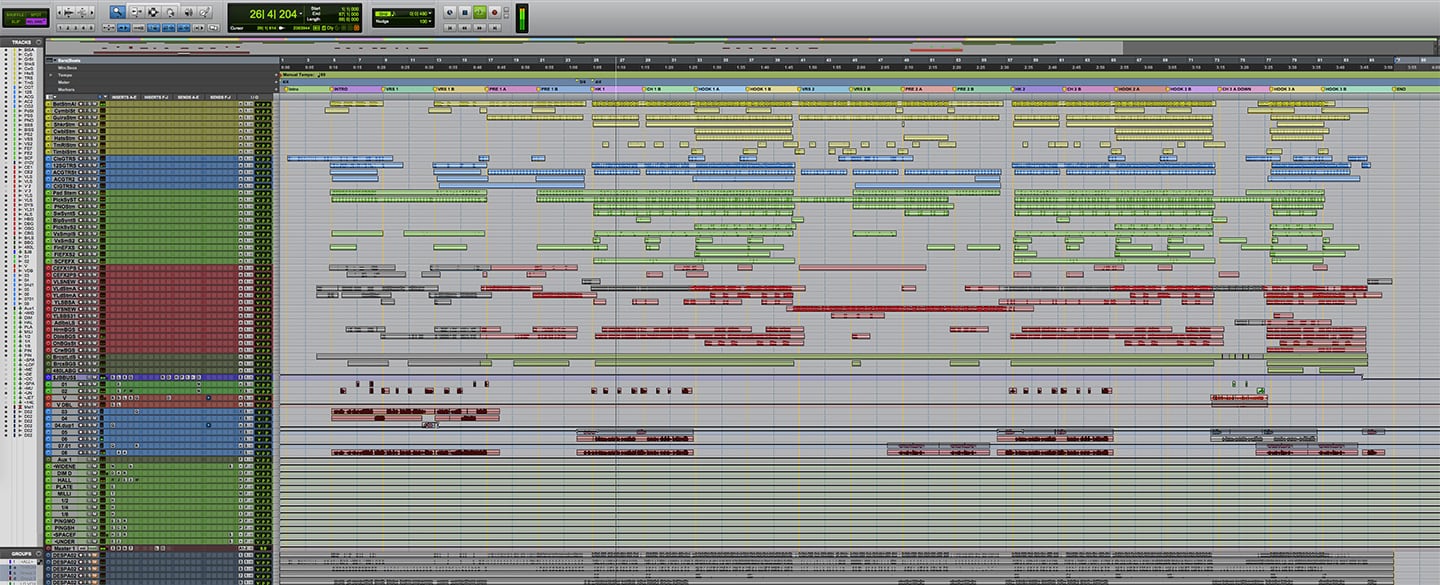
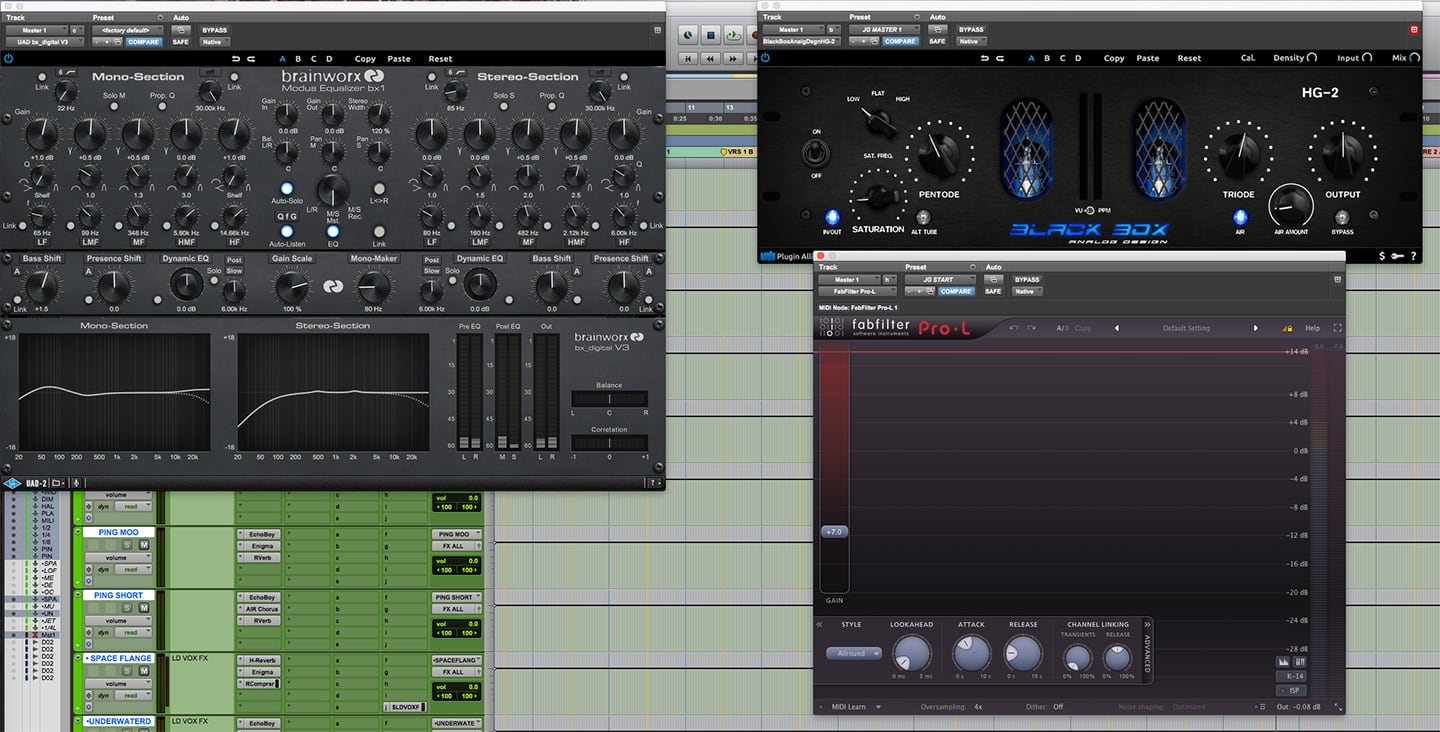


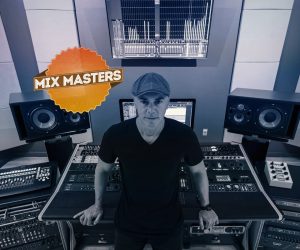

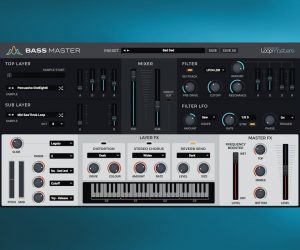




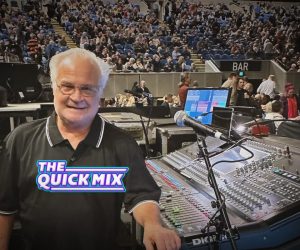






it’s colombia not columbia
Thanks. Will amend.